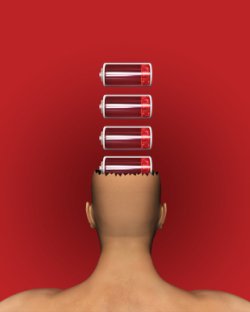Don't let decision fatigue prevent effective decision making
 Do we get tired of making decisions? An article from The New York Times points to some research that takes a closer look at the idea of decision fatigue. The article provides the results from a number of studies and experiments by brain researchers that suggests our ability to make good choices degrades after long periods of thoughtful decision making. We, in essence, experience a loss in willpower resulting from decision fatigue. This can lead to surrendering to choices we might otherwise avoid.
Do we get tired of making decisions? An article from The New York Times points to some research that takes a closer look at the idea of decision fatigue. The article provides the results from a number of studies and experiments by brain researchers that suggests our ability to make good choices degrades after long periods of thoughtful decision making. We, in essence, experience a loss in willpower resulting from decision fatigue. This can lead to surrendering to choices we might otherwise avoid.
What is decision fatigue?
If you have ever been involved in a day long set of meetings that had goals of reaching conclusion on a number of critical decisions, you may already have an understanding of decision fatigue. Early decisions receive careful scrutiny and thoughtful deliberation, but as the end of the day is reached, people are ready to accept expeditious alternatives to end the meeting and head off to dinner.
Research has been active in this area for some time, and similar effects have also been referred to as brain fatigue, mental or mind fatigue, and ego depletion. There seems to be broad agreement on the symptoms. However, a quick scan of the research indicates that there is not agreement on the cause.
Examples from some of the studies
The studies identify a number of examples that are used to demonstrate decision fatigue. Cases include:
- Parole board decision making by judges reviewing cases for Israeli prisons
- Quarterback's questionable choices made late in the game
- Doing arithmetic problems after shopping at the mall. (This one reminds me of trying to help my son with math homework after a trying day at work.)
- Choosing and configuring features for a computer
- Picking options for a new car
- Weighing the options for items purchased on a tight budget during shopping and how it can lead to impulse purchases (see more on consumer decision making)
- Resisting the urge to eat a cookie that affects deciding between two jobs (using your willpower to resist eating the cookie negatively impacts your ability to make a sound choice between the two jobs)
It should be pointed out that these studies distinguish decision or brain fatigue from physical fatigue. Participants in the studies and experiments indicate that they are not physically tired. Conclusions suggest that our mental resources used for decision making are consumed or exhausted, causing our ability to decide between options to suffer after repeated decision tasks over an extended period of time.
Possible implications
 The suggestion from much of the research is that our decision making energy can be exhausted. Our willpower will diminish as we continue to make decisions, even small ones. John Tierney's New York Times article points to a brain glucose connection where sugar provided by lemonade appeared to mitigate decision fatigue.
The suggestion from much of the research is that our decision making energy can be exhausted. Our willpower will diminish as we continue to make decisions, even small ones. John Tierney's New York Times article points to a brain glucose connection where sugar provided by lemonade appeared to mitigate decision fatigue.
However, the studies are not fully conclusive, and another researcher, Carol Dweck, questions the theory. She provides evidence that suggests that our beliefs about willpower actually determine how long we can stick to challenging mental tasks that include decision making.
What can we do to help prevent decision fatigue?
While the research provides some compelling evidence, conclusions can be risky due to lack of a proven cause-effect relationship. However, here are some ideas to consider that can help avoid the irrational biases that are suggested by decision fatigue.
- Take advantage of our decision making tips - Many of the tips on prioritization, timing, and process can help avoid brain fatigue and provide the discipline that might maintain willpower.
- Accommodate people needs when planning extended decision making sessions - We already know people's thought processes degrade when physically fatigued. Planning for group decision making can also accommodate mental fatigue by having breaks, providing refreshments, and having agenda changes that vary which mental resources are required.
- Build habits that avoid temptation - If willpower is a resource that can be exhausted, structuring routines that avoid undesired enticements can reserve energy for difficult decision making.
- Use the process - Following a decision making process helps prevent errors. If you start to short circuit the process, it probably suggests that physical or mental fatigue may have set in.
- Choose your beliefs about willpower - Willpower may go farther than we expect. A little research on this topic could change what you believe and increase your ability to stay engaged during lengthy decision efforts.
- Add some delay and get some rest - Time and some sleep can reduce emotions that lead to thinking errors and poor choices.
The research into the concept of decision fatigue, while still evolving, does point to behavior we commonly experience. Using the tips above can help you avoid a loss in integrity in your decision making effectiveness.

